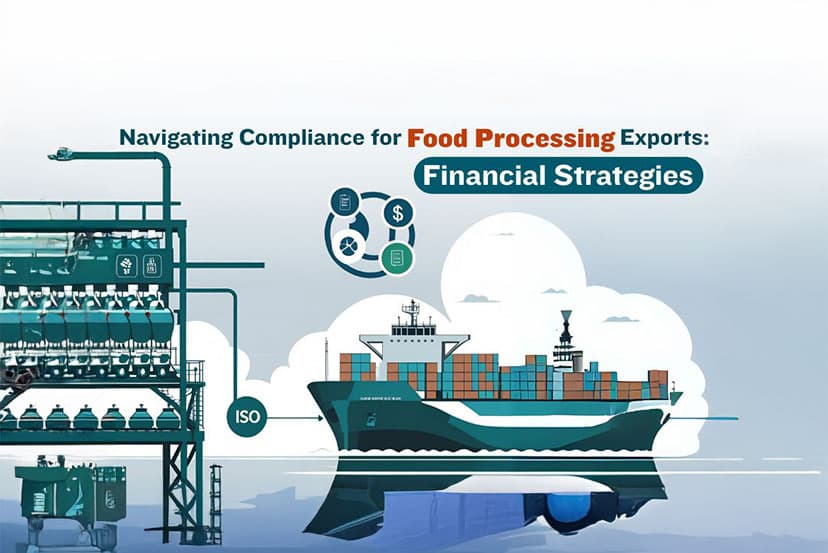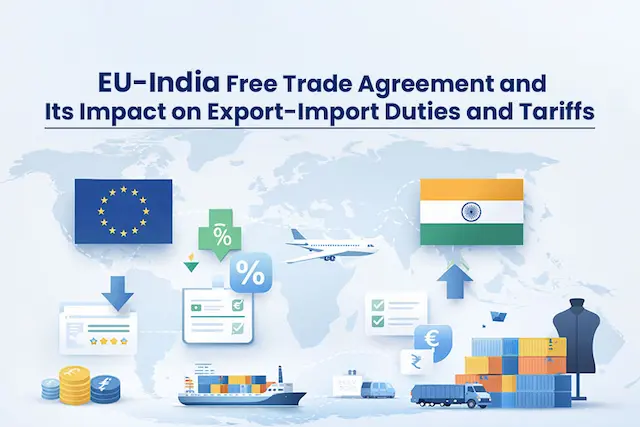The processed food cannot be exported easily to simply fulfil the demand in the foreign market; rather, it has to pass the stringent global standards. As an exporter, meeting food safety regulations and containing costs can be a challenge. However, through the appropriate financial planning, one can remain compliant and competitive.
Understanding the Financial Impact of Export Regulations
Compliance commonly builds up financial pressure on food processing exporters in certain areas. Before looking at how to deal with such pressures, it is important to break them down.
- Meeting Food Export Compliance Standards
Foreign food markets demand that exporters abide by stringent health, hygiene, and packaging regulations. Be it FDA, FSSAI, or EU food law, failure to comply with them may result in rejection of shipments and loss of revenue. The financial planning happens through the maintenance of updated food export compliance.
- High Costs of Documentation and Approvals
The process of organizing a full documentation set–the certificates of origin, health clearance, and custom documents- can put a strain on your pocket. Late documents or incomplete documents usually lead to fines or returns, making control of export documentation cost a priority.
- Food Safety Audits and Certification Expenses
The exporters must have certifications such as ISO 22000, HACCP, and BRC to sell their products in the global market. Such audits usually come with consultancy costs and a change of systems. The non-passing of such audits may cause credibility problems, and hence, food safety audits are a necessary, albeit expensive, expense.
- Labelling and Packaging for Different Markets
Exporters of food products need to comply with labels as per the requirements of the destination country in terms of ingredient declarations, expiry dates, and nutrition information. The repeated packaging redesign because of the changes in regulations creates repeated costs of food labelling compliance.
- Quality Control Systems and Traceability
Buyers and regulators demand that food batches can be fully traced back to the production and to the shelf. Setting up and implementing food traceability systems does more than ensuring compliance; it also guarantees that buyers have confidence in case of a recall or other problem.
- Product Testing and Quality Reporting
Exporters are frequently required to submit laboratory-tested reports on the quality of products, their shelf life, or the level of contamination. This regular testing, particularly by accredited laboratories, is a costly but necessary procedure. To remain compliant, it is important to continually invest in food products testing.
Smart Financial Moves to Stay Compliant
As we have discussed the significant compliance costs, it is time to look at the financial strategies useful in enabling exporters to effectively deal with the pressures. Here are a few methods to apply –
- Plan Compliance Spending in Advance
Most of the exporters struggle with the surprise compliance costs. Instead, include a fixed category in your operating budget. This is called compliance cost planning; it can be used to avoid running out of cash at a critical shipment or audit.
- Fund Certifications with Working Capital Loans
Quality system upgrades or even international certifications require months, and in most cases, will impact your cash cycle. Working capital for exporters means you can afford to pay consultants, buy tools, and get ready for audits, all without tying up operating cash.
- Finance Testing and Approvals through Export Loans
The customers usually make payment upon receipt of delivery; however, enforcement requirements, such as lab tests and inspections, are required in advance. Export financing food industry allows exporters to fulfil these expenses upfront as they await payment without having an unhealthy cash flow.
- Adopt Digital Compliance Management Tools
Workflows can be simplified by using software-based tools to replace certification, document, and inspection management. Though it requires an upfront cost, compliance management software decreases manual errors, audit risks, and costs in the long run.
- Save Money with Combined Certifications
Instead of providing separate audits in each country, exporters have the option of a bundle certification that focuses on several markets. The benefit of such a strategy is not only the simplification of the procedure but also the reduction of the expenses incurred due to the bundled food certifications.
- Explore Government Grants and Subsidies
Keep your team informed about the changes in food laws of target countries in advance. Making changes at the beginning prevents last-minute expenses. Updating on food export requirements prevents failure penalties or refusal of shipments.
- Manage Delayed Payments with Invoice Discounting
The buyers overseas can take 60-90 days to pay, but the certifications, packaging, and logistics require upfront payment. By using invoice discounting for exporters‘ businesses can access working capital in advance to meet these upfront costs without having to borrow conventionally.
- Choose Compliant Logistics and Export Partners
Escape extra compliance problems by working with logistics partners who have embedded documentation solutions, temperature control, and new food safety measures. The presence of export logistics compliance minimises the number of errors and expenses that occur concerning rejected shipments.
- Build In-House Compliance Skills
Developing your own quality assurance or export team and training them on how to deal with audits, package modification, or dealing with regulatory changes can also lessen the consulting reliance. This in-house investment in internal compliance training is economical in the long term.
Use Financial Planning to Simplify Export Compliance
The food processing industry exporters deal with one of the most complicated compliance requirements. However, with the strategic application of financial tools, one could minimise the burden. Intelligent budgeting, invoice financing, working capital loans, and tech updates not only ease the pressure- they can make compliance your competitive edge. With your food export company operating with certainty in compliance and financial effectiveness, expanding into foreign markets would be easier and more sustainable.
Credlix provides exporters of food products with quick, adaptive, and paperless funding. Whether you need to fund Lab tests, meet packaging requirements, or upgrade to international certifications, Credlix has the funding you require. Whether it’s invoice discounting or working capital loans, we have the solutions that will keep your export engine running smoothly while ensuring 100% compliance.




